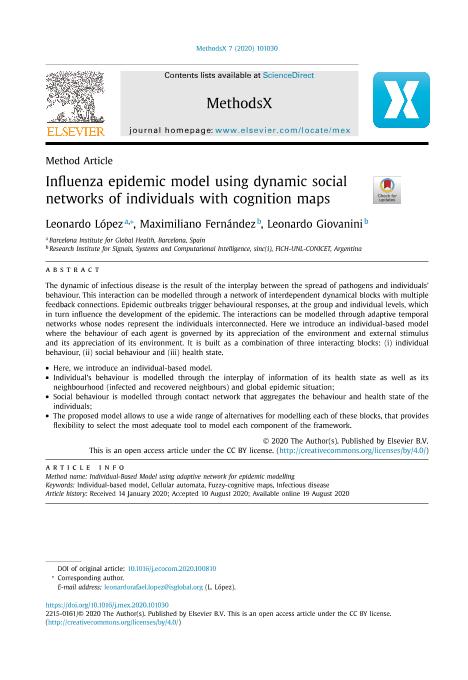Artículo
Influenza epidemic model using dynamic social networks of individuals with cognition maps
Fecha de publicación:
01/2020
Editorial:
Elsevier
Revista:
MethodsX
e-ISSN:
2215-0161
Idioma:
Inglés
Tipo de recurso:
Artículo publicado
Clasificación temática:
Resumen
The dynamic of infectious disease is the result of the interplay between the spread of pathogens and individuals’ behaviour. This interaction can be modelled through a network of interdependent dynamical blocks with multiple feedback connections. Epidemic outbreaks trigger behavioural responses, at the group and individual levels, which in turn influence the development of the epidemic. The interactions can be modelled through adaptive temporal networks whose nodes represent the individuals interconnected. Here we introduce an individual-based model where the behaviour of each agent is governed by its appreciation of the environment and external stimulus and its appreciation of its environment. It is built as a combination of three interacting blocks: (i) individual behaviour, (ii) social behaviour and (iii) health state. • Here, we introduce an individual-based model. • Individual's behaviour is modelled through the interplay of information of its health state as well as its neighbourhood (infected and recovered neighbours) and global epidemic situation; • Social behaviour is modelled through contact network that aggregates the behaviour and health state of the individuals; • The proposed model allows to use a wide range of alternatives for modelling each of these blocks, that provides flexibility to select the most adequate tool to model each component of the framework.
Archivos asociados
Licencia
Identificadores
Colecciones
Articulos(SINC(I))
Articulos de INST. DE INVESTIGACION EN SEÑALES, SISTEMAS E INTELIGENCIA COMPUTACIONAL
Articulos de INST. DE INVESTIGACION EN SEÑALES, SISTEMAS E INTELIGENCIA COMPUTACIONAL
Citación
López, Leonardo; Fernández, Maximiliano Andrés; Giovanini, Leonardo Luis; Influenza epidemic model using dynamic social networks of individuals with cognition maps; Elsevier; MethodsX; 7; 1-2020; 1-14
Compartir
Altmétricas




